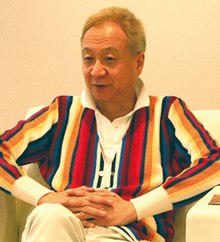Kazuhiko Katō
This article needs additional citations for verification. (October 2009) |
Kazuhiko Katō | |
|---|---|
 Katō in 2008 | |
| Background information | |
| Born | March 21, 1947 Fushimi-ku, Kyoto, Japan |
| Died | October 17, 2009 (aged 62) Karuizawa, Nagano, Japan |
| Genres | Folk, pop, rock, psychedelia |
| Occupation(s) | Record producer, composer, and singer |
| Years active | 1967–2009 |
Kazuhiko Katō (加藤 和彦, Katō Kazuhiko, March 21, 1947 – October 17, 2009), nicknamed "Tonovan" (トノヴァン), was a Japanese record producer, songwriter and singer. He sometimes used the spelling of "Kazuhiko Katoh".
History
[edit]As a member of the Folk Crusaders, Katō launched his recording career in the mid-1960s. "Kaettekita Yopparai (I Only Live Twice)", their psychedelic debut song composed by Katō and released in 1967, sold more than 1.3 million copies in Japan, and became one of the best-selling singles of the early Japanese popular music industry.[1] The group also starred in director Nagisa Oshima's 1968 film Kaette kita yopparai (alternately known as Sinner in Paradise or Three Resurrected Drunkards).
After the breakup of Folk Crusaders in 1970, Katō gained success for his production works for other musicians, including Shigeru Izumiya, Mariya Takeuchi, and Takuro Yoshida. In particular, Sadistic Mika Band, the acclaimed project he started with his first wife Mika Fukui, received international success. Their 1974 album entitled Kurofune (The Black Ship) is regarded as one of the most significant Japanese rock albums of the mid-1970s. The group was disbanded and reassembled again several times, with new vocalists such as Yumi Matsutoya, Karen Kirishima, and Kaela Kimura.[2]
As a composer, Katō wrote the theme song "Ai Oboete Imasu ka" for the anime film Macross: Do You Remember Love?, which was released during the summer of 1984 in Japan. He later formed a songwriting team with his second wife, the late Kazumi Yasui. Most of the songs they wrote were recorded and produced by Kenji Sawada. In 1990, Katō teamed up with graphic artists, Haruhiko Shono and Kuniyoshi Kaneko, to provide the music for the award-winning Japanese computer game, Alice.
In March 2008, Katō formed the rock band Vitamin-Q with Masami Tsuchiya, Gota Yashiki, Rei Ohara and Anza.
Death
[edit]Katō committed suicide by hanging on October 17, 2009, at a hotel in Karuizawa, Kitasaku District, Nagano Prefecture, Japan. Police discovered a suicide note in his hotel room.[3]
Albums
[edit]Titles in brackets are for rough translation purposes only.
- ぼくのそばにおいでよ (Come Near Me) (1969)
- スーパー・ガス (Super Gas) (1971)
- それから先のことは (Then What Lies Ahead) (1976)
- ガーディニア (Gadinia) (1978)
- パパ・ヘミングウェイ (Hemingway Papa) (1979)
- うたかたのオペラ (1980) (Better known as "L'opéra fragile")
- ベル・エキセントリック (Belle Excentrique) (1981)
- あの頃、マリー・ローランサン (Around Her, Marie Laurencin) (1983)
- ヴェネチア (Venice) (1984)
- マルタの鷹 (The Maltese Falcon) (1987)
- ボレロ・カリフォルニア (California Bolero) (1991)
References
[edit]- ^ List of million-selling singles on the Japanese Oricon Weekly Chart (up to October 2009)--- "Kaettekita Yopparai"is listed as the 116th best-selling single in that country
- ^ "Sadistic Mika Band was reunited with Kaela Kimura" (in Japanese). Nikkan Sports. January 29, 2006. Retrieved October 18, 2009.
- ^ "Musician Kazuhiko Kato found hanged at Karuizawa hotel". Kyodo News. 2009-10-17. Archived from the original on 2009-10-21. Retrieved 2009-10-18.
External links
[edit]- 1947 births
- 2009 suicides
- 2009 deaths
- 20th-century Japanese composers
- Japanese folk singers
- Japanese male composers
- Japanese male singer-songwriters
- Japanese singer-songwriters
- Japanese record producers
- People from Fushimi, Kyoto
- Singers from Kyoto
- Suicides by hanging in Japan
- 20th-century Japanese male singers
- 20th-century Japanese singers
- Sadistic Mika Band members
- The Folk Crusaders members
- Japanese male guitarists
- Japanese rock guitarists
- Japanese male rock singers
